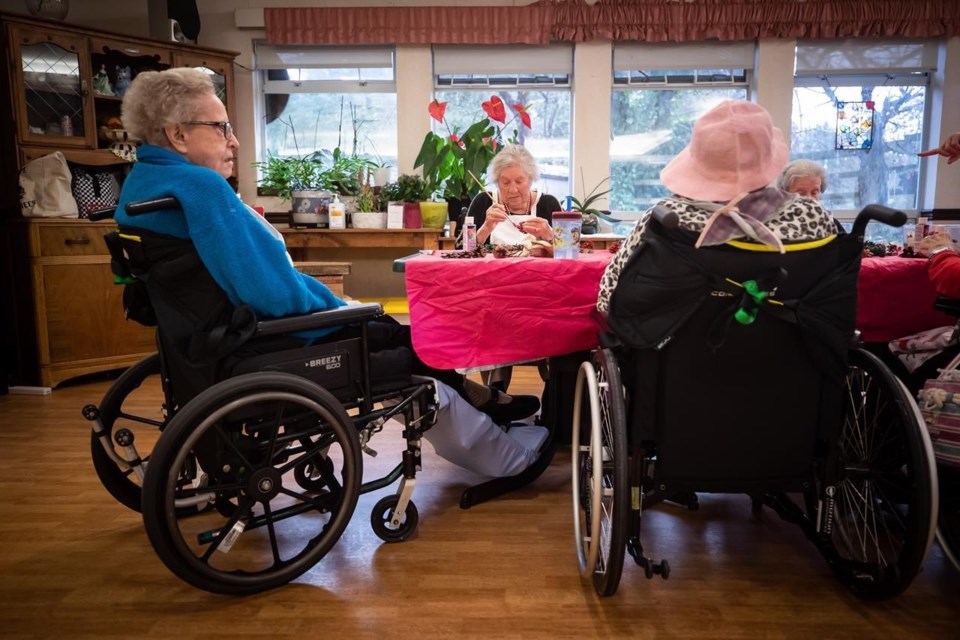VICTORIA — British Columbia's seniors advocate is asking the province to designate one person as an essential visitor for every long-term care resident as the facilities move to stem the spread of COVID-19.
Isobel Mackenzie said Thursday the need to limit visitors has left a majority of long-term care residents without visits from loved ones.
The province announced last week that visits to long-term care and assisted living facilities would be limited to essential visitors in response to the fast-spreading Omicron variant and would be re-evaluated Jan. 18.
Mackenzie said in a statement the process for determining if a resident meets the criteria to have a designated essential visitor is made by the administrator of the facility on a case-by-case basis.
Essential visitors often give vital support care to seniors, especially as these places face staff absences of up to 30 per cent because of COVID-19, she said in a news release Thursday.
"They help to feed their loved one, get them dressed, take them for walks, and keep them engaged," she said.
"For many residents, these visitors are the only people who can motivate them to engage in any activities, and yet they are not formally recognized as essential."
Provincial health officer Dr. Bonnie Henry agreed during her weekly briefing on Tuesday that visitors in care homes are essential, saying that once rapid tests are deployed in each facility, they'll go back to allowing every resident to have a designated social visitor and an essential visitor.
The federal government said Wednesday that it would be distributing 140 million rapid tests to provinces and territories this month.
B.C. reported 3,223 new cases of COVID-19 Thursday, along with a rise in hospitalizations.
The Ministry of Health said in a statement there are 324 people in hospital and 90 are in intensive care.
There have been three new deaths to bring the total number since the pandemic began to 2,430.
The ministry also said there have been 16 new health-care facility outbreaks for a total of 37 active outbreaks, many of them in seniors care facilities.
A recommendation made by the Office of the Seniors Advocate in November 2020 said all residents must be provided the opportunity to designate an essential visitor.
Mackenzie said her office has received calls from family members, including spouses, who say they can no longer visit, even though they are helping care for the senior. It is only the resident and their families who truly know who is essential to their health and well-being, she added.
"Care home operators are significantly overburdened," she said.
"They need the clarity from the province that every resident is entitled to an essential visitor and be relieved of the staff resources required to manage the essential visitor designation process."
Terry Lake, chief executive officer of the BC Care Providers Association, said one of the difficulties for facilities is interpreting what an essential visitor is when health authorities and home operators have differing views.
Guidance from the Ministry of Health last year defined essential visits as those that are "necessarily linked with an essential need that could not be met in the absence of the essential visit."
Lake, whose group represents over 400 long-term care and other such facilities in B.C., said it can be argued that feeding and getting someone dressed is something staff can do.
"And that's where we get into trouble,” he said in an interview on Thursday.
“(The ministry) needs to liberalize the definition and reduce the workload on care home staff to make this possible."
The seniors advocate should just say that everyone is entitled to a visitor, Lake said.
The mental and physical toll on seniors cut off from their families is "huge," especially if that person has dementia or Alzheimer's, he said.
"As wonderful as staff are, they're not family.”
This report by The Canadian Press was first published Jan. 6, 2022.
The Canadian Press
Note to readers: This is a corrected story. A previous version said a recommendation on visitors to care homes from the Office of the Seniors Advocate was made last November. In fact, it was made in November 2020.



